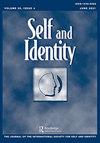黑暗人格特质与自我认知中较弱的道德善良的真我偏见有关
IF 2.1
4区 心理学
Q3 PSYCHOLOGY, SOCIAL
引用次数: 0
摘要
摘要:我们研究了黑暗三合会(DT)特征是否会调节人们将道德特征与真实自我联系起来的倾向。我们假设,DT特征较高的人会表现出较弱的倾向,将道德(与不道德)特征视为其身份的核心。本科生参与者(N = 345)评定了道德/能力领域中积极/消极特征的感知身份中心性,并完成了精神病、自恋和马基雅维利主义的测量。总体而言,积极的道德(与不道德和积极的能力相比)特征被视为更具身份中心,但这种影响在DT特征较高的参与者中较弱。此外,所有DT特征都对道德(不道德)特征的身份中心性做出了负面(正面)预测。这些发现扩展了对黑暗三合会中真实自我认知和道德认同的研究。本文章由计算机程序翻译,如有差异,请以英文原文为准。
Dark triad traits are associated with a weaker morally-good true self bias in self-perceptions
ABSTRACT We examined whether Dark Triad (DT) traits moderate people’s tendency to associate moral traits with their true self. We hypothesized that people high in DT traits would show a weaker tendency to view moral (vs. immoral) characteristics as central to their identity. Undergraduate participants (N = 345) rated the perceived identity centrality of positive/negative traits in domains of morality/competence, and completed measures of psychopathy, narcissism, and Machiavellianism. Positive moral (vs. immoral and positive competence) traits were seen as more identity central overall, but this effect was weaker among participants high in DT traits. Further, all DT traits negatively (positively) predicted the identity centrality of moral (immoral) traits. These findings extend work on true self-perceptions and moral identity in the Dark Triad.
求助全文
通过发布文献求助,成功后即可免费获取论文全文。
去求助
来源期刊

Self and Identity
PSYCHOLOGY, SOCIAL-
CiteScore
5.10
自引率
5.00%
发文量
26
期刊介绍:
Work on self and identity has a special place in the study of human nature, as self-concerns are arguably at the center of individuals" striving for well-being and for making sense of one"s life. Life goals develop and are influenced by one"s view of what one is like, the way one would ideally like to be (or would like to avoid being), as well as one"s perceptions of what is feasible. Furthermore, conceptions of self and the world affect how one"s progress towards these goals is monitored, evaluated, redirected, re-evaluated, and pursued again. Thus, the “self” as a construct has far-reaching implications for behavior, self-esteem, motivation, experience of emotions and the world more broadly, and hence for interpersonal relationships, society, and culture.
 求助内容:
求助内容: 应助结果提醒方式:
应助结果提醒方式:


